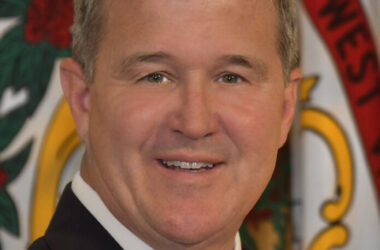By Dr. Chris Martin, professor, WVU School of Public Health
If I asked you, “To whom do we owe our personal freedoms as Americans?”, who would you pick? You might name our first president, George Washington. Some of you may choose Thomas Jefferson, the chief author of the Declaration of Independence. For this reason, political figures often harken back to our Founding Fathers when matters of liberty are involved. Since much of the current opposition to vaccines is framed as a matter of personal freedom, it is therefore worthwhile to ask what our Founding Fathers might have thought about requiring people to receive vaccines.
Throughout the Revolutionary War, the deadly and highly contagious smallpox virus was raging. During the siege of Boston in July 1775, the entry of American troops was delayed due to an outbreak in the city. The situation was far worse in December 1775, when the Continental Army was forced to lift the siege of Quebec and retreat back to New York with much loss of life. John Adams wrote, “Our misfortunes in Canada are enough to melt the heart of stone. The smallpox is ten times more terrible than the British, Canadians, and Indians together. This was the cause of our precipitate retreat from Quebec.” Further, smallpox was also having a negative impact on enlistment. The Governor of Connecticut wrote to Washington, “Fear of the Infection operates strongly to prevent Soldiers from engaging in the Service, and the Battalions ordered to be raised in this Colony fill up slowly.” It is therefore not surprising that Washington came to regard smallpox as a greater foe than the British Army, writing in January 1777, “we have more to dread from it than from the sword of the enemy.”
There was, however, a tool available at the time to help. It was not vaccination, an invention credited to Dr. Edward Jenner that was to come along some 20 years later, but inoculation, in which people were deliberately infected with a less severe strain of the smallpox virus to develop milder disease and lifelong immunity. Inoculation was also vastly more dangerous than vaccination and, for that reason, its use was highly controversial at the time. Nevertheless, in February 1777, Washington informed Congress of his decision to order that all his troops be inoculated, the first such mandate in American history. The campaign was successfully carried out in Morristown, New Jersey, and Philadelphia that winter to allow the troops time to recover before the spring fighting resumed. It was also done in complete secrecy from the British so they could not take advantage of large numbers of convalescing soldiers. Thereafter, very little about smallpox is seen in the historical records as the Continental Army moved south and on to eventual victory. Enlistment surged in 1777. Every Founding Father who wrote on the topic supported Washington’s decision. Many military historians credit Washington’s bold action as a factor in later military successes. Support for smallpox inoculations spread throughout the new United States of America.
Adams was inoculated by another Founding Father and hero of the War, Dr. Joseph Warren. In the Battle of Bunker Hill, Warren chose to forgo his rank as major general and fight as a private soldier, paying the ultimate price. Once Jenner’s new vaccine became available, known as kinepox, Jefferson was active in promoting it, including through a personal endorsement. He wrote to Merriwether Lewis during the preparations for the Lewis and Clark Expedition, “[C]arry with you some matter of the kine-pox; inform those of them with whom you may be, of its efficacy as a preservative from the small pox; and instruct & encourage them in the use of it.” Perhaps the most heart-breaking message on this topic comes from Benjamin Franklin. Franklin chose not to inoculate his four-year-old son Francis as the boy was not feeling well at the time. “In 1736, I lost one of my sons, a fine boy of four years old, by the small-pox, taken in the common way. I long regretted bitterly, and still regret that I had not given it to him by inoculation. This I mention for the sake of parents who omit that operation, on the supposition that they should never forgive themselves if the child died under it: my example showing that the regret may be the same either way, and that, therefore, the safer should be chosen.”
If the Founding Fathers were alive today, I think it is clear what they would think about the multitude of safe and effective vaccines we have available as well as the requirements to receive them. As a postscript, why don’t we hear anything about smallpox these days? Unlike our Founding Fathers, we will never suffer the disfigurement that Washington did from his infection as a young man or lose a child as Franklin did. It was forever eradicated from the earth in 1980 ….. thanks to vaccination.
Dr. Chris Martin is a professor in the West Virginia University School of Public Health, program director of the WVU Occupational Medicine Residency Program and director of Global Engagement Office





